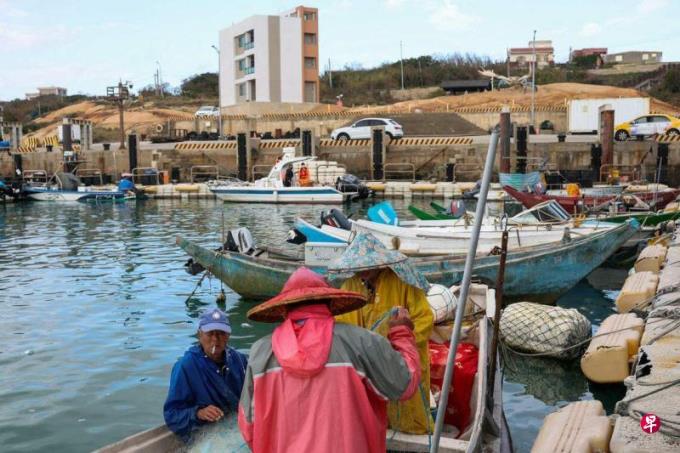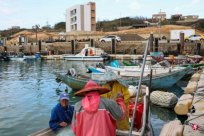
This collision incident is not yet ended. When cross -strait relations in the next four years will still be weird, I don’t think that the United States will directly conflict with mainland China for the Golden Horse.Make this.However, if the Golden Horse is in a hurry, the United States is likely to take the opportunity to strengthen military cooperation, and the relationship between cross -strait relations and Sino -US relations will inevitably worsen.
Recently, cross -strait relations have been pushed to the cusp of public opinion due to the collision of the seas of the Xiamen and Golden Sea. It happened that the author has also sorted out the historical evolution of the Taiwan Strait policy recently.In the literature.Fun the past, or have teaching.
Readers who are familiar with the history of cross -strait relations know that when the People's Republic of China was established in October 1949, the Kuomintang regime was still based on parts of South China and southwest, as well as many near -sea islands in Zhejiang, Fujian and Guangdong.The Zhoushan Islands and Taizhou Islands in Zhejiang, Matsu Islands in Fujian, and Golden Gate Islands and so on.In late October 1949, the PLA launched a landing battle against Kinmen Island in order to prepare for the next step to capture the Taiwan Peng area. It is known as the Kinmen Campaign (the Taiwan side is called the "Guning Head Battle").However, this campaign was mainly due to the unwavering of the PLA's fashion and the weakness of the naval power, and caused great losses.
During the same period, the Truman government of the United States is implementing a policy against China and the Taiwan Strait policy that has been escaped from the Chinese civil war. The tone on Taiwan's issue is to "abandon Chiang and Taiwan", that is, Chiang Kai -shek will no longer support Chiang Kai -shek against the Communist Party.Japan has returned to China after surrender.This tone is concentrated in a policy statement issued by President Truman himself on the morning of January 5, 1950, as well as the policy interpretation made by the then Secretary of State Edison at the press conference that day.
But the debate in the United States' policy on China has not subsided.The contacts represented by the State Council advocated abandoning Jiang abandoning the Taiwan, and the relationship between the somedere (total) and the Soviet Union, and waited for the opportunity to contact New China and finally established diplomatic relations.The hardliners represented by General MacArthur advocated continue to anti -communist Taiwan to prevent "the expansion of the Communist forces in the Western Pacific."During this period, events such as the China -Soviet Union Treaty and the Kuomintang regime evacuated from Zhoushan, especially the Sino -Soviet Union, which caused a significant impact on the morale of contact, and the opinions of the hardliners gradually occupied the upper hand.
On June 25, 1950, North Korea attacked South Korea and the Korean War (Korean War) broke out.The United States has a trend in policy controversy against China. Two days later, on June 27th, Truman issued a new policy statement that in addition to the announcement of supporting South Korea's "resistance to aggression", the seventh fleet was also sent to the Taiwan Strait to prevent the cross -strait from crossing the fire again.And proposed that "the determination of the future status of Taiwan, the restoration of the Pacific Ocean, the signing of the Japanese treaty or the consideration of the United Nations."This last sentence was that the "Taiwan status was unremitted", which was later regarded by Taiwan independence forces as a Gui, and became the background of the "one China" policy in the United States.
In other words, the outbreak of the Korean War has changed the United States' awareness of Taiwan's status, ending the US abandonment policy, and promoting Baotai and Baohan (country) at the same time.Mainland China also began to fight against the United States in October of that year, and the Taiwan issue was temporarily put on hold.After the ceasefire in the Korean War in July 1953, China once again resolved the issue of Taiwan's issue on the agenda. In September 1954, it took the lead in taking action on the Taizhou Islands on the coast of the southern Zhejiang.I have to retreat from the neighboring Dachen Island again.Since then, the Kuomintang regime -controlled mainland's offshore islands have only the Matsu Islands and Golden Gate islands in Fujian.
The Treaty of the United States and Taiwan will not mention Golden Horse
There are differences in opinion on the defense issues of the islands between the United States and Chiang Kai -shek (referred to as the Golden Horse).Chiang Kai -shek believes that the Golden Horse Island is the best springboard for the Kuomintang regime to counterattack the mainland in the future and must adhere to it.The United States believes that the Golden Horse islands are too close to the mainland. It is easy to attack and difficult to defend. The cost performance of resource investment is too low, and the owner gives up.The United States also has a deeper consideration that it advocates the governance of cross -strait gorge, making it more difficult for the KMT and the Communist Party to attack each other and maintain the cost of peace in Taiwan.With the opinions of this issue of the United States and Chiang, the United States and Chiangki signed a "common defense treaty" in December 1954. The United States clearly promised to protect Taiwan and Penghu Islands.The same regulations were also provided in the U.S. Congress authorized President's authorized President in the Taiwan Strait area in the Taiwan Strait area.
Chiang Kai -shek held up the pressure of the United States and continued to stay in the Golden Horse Island.
On August 23, 1958, after comprehensively considering various factors in mainland China, Mainland China firmed Kinmen again. The Kuomintang defenders also welcomed each other with artillery, and the United States continued to pressure Chiang Kai -shek to withdraw from the Golden Horse.According to the relevant documents in the mainland, Mao Zedong realized that the United States' intention was to be governed by the Communist Party of China, and even promoted the independence of Taiwan, and was worried that the unity of both sides of the strait would be more difficult in the future.The new strategy of "attack and not taking" the Golden Horse has been proclaimed to the United States and the international community.
The Golden Gate Artillery Battle has also gradually evolved from the initial daily real -daily bomb attack to the classic scene of "singles and doubles", only firing empty artillery shells and publicity bombs, and continued until the eve of the establishment of diplomatic relations between China and the United States at the end of 1978.
After the New Year's Day of the New Year's Day in 1979 and the establishment of diplomatic relations between China and the United States, the U.S. Congress resented the Carter government to abandon Taiwan's official.Taiwan relations set a framework for the new Taiwan Strait policy.When the law defines the geographical boundary of the term "Taiwan", it still only includes Taiwan and Penghu Islands.At that time, Zablocki, chairman of the House of Foreign Affairs Committee, clearly explained the main reason why it was not included in the Golden Horse Island: First, because the "Common Defense Treaty" in 1954, the Golden Horse island is not the Kinhsa."Taipei and Beijing believe that Kinmen Matsu is part of Mainland China." Therefore, the United States should not expand the security commitment to Taiwan to the areas outside Taiwan Peng.
This is true.In the early days of the Kuomintang regime in 1949, the administrative division of its actual jurisdiction was removed from Taiwan Province, and it also included Zhejiang and Fujian Province.After retreating from Dachen in 1955, only Taiwan and Fujian Province remained.Fujian Province under the official jurisdiction of Taiwan, in fact, only Kinmen County, which is the main body of the Golden Gate Island, and Lianjiang County, which is the main body of the Mazu Islands. Fujian Province is undoubtedly a mainland province.Therefore, the saying of "Taipei and Beijing that Golden Gate is part of the Chinese mainland" of American members of the United States.
It is regrettable that Sino -US relations have evolved from the status of the 1980s to today's comprehensive strategic competition. The Golden Horse area has also re -turned from the model of cross -strait relations on cross -strait relations in the Ma Yingjiu era to the forefront of cross -strait confrontation.When the collision incident has not ended, and cross -strait relations in the next four years will still be weird, the author does not think that the United States will directly conflict with mainland China for the Golden Horse's defense, because the Taiwan Relations Law has not authorized this.Although there were previously rumors that American active soldiers had gone to Kinmen to assist in the training platform, after all, training was different from the defense.However, if the Golden Horse is in a hurry, the United States is likely to take the opportunity to strengthen military cooperation, and the relationship between cross -strait relations and Sino -US relations will inevitably worsen.
The author is executive deputy director of the Taiwan Research Center of Shanghai Jiaotong University




